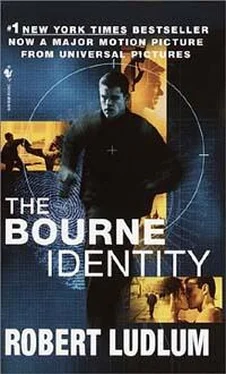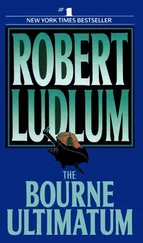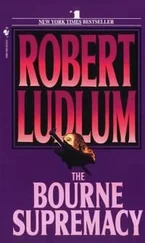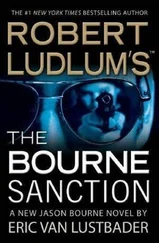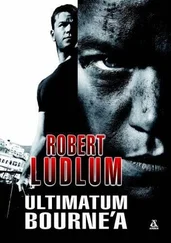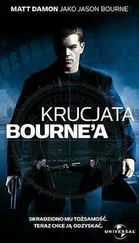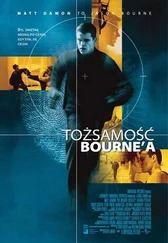The elevator door scraped open. The floor was three-quarters filled with cars, deserted otherwise.
Jason tried to recall where he had parked the Renault; it was in a far corner, he remembered that, but was it on the right or the left? He started tentatively to the left; the elevator had been on his left when he had driven the car up several days ago. He stopped, logic abruptly orienting him. The elevator had been on his left when he had entered, not after he had parked the car; it had been diagonally’ to his right then. He turned, his movement rapid, his thoughts on a road between Chevreuse and Rambouillet.
Whether it was the sudden, unexpected reversal of direction or an inexperienced surveillance, Bourne neither knew nor cared to dwell upon. Whichever, the moment saved his life, of that he was certain. A man’s head ducked below the hood of a car in the second aisle on his right; that man had been watching him. An experienced surveillance would have stood up, holding a ring of keys he had presumably picked up from the floor, or checked a windshield wiper, then walked away. The one thing he would not do was what this man did; risk being seen by ducking out of sight.
Jason maintained his pace, his thoughts concerned on this new development. Who was this man?
How had he been found? And then both answers were so clear, so obvious he felt like a fool. The clerk at the Auberge du Coin.
Carlos had been thorough—as he was always thorough—every detail of failure examined. And one of those details was a clerk on duty during a failure. Such a man bore scrutiny, then questioning; it would not be difficult. The show of a knife or a gun would be more than sufficient. Information would pour from the night clerk’s trembling lips, and Carlos’ army ordered to spread throughout the city, each district divided into sectors, hunting for a specific black Renault. A painstaking search, but not impossible, made easier by the driver, who had not bothered to switch license plates. For how many unbroken hours had the garage been watched? How many men were there? Inside, outside?
How soon would others arrive? Would Carlos arrive?
The questions were secondary. He had to get out. He could do without the car, perhaps, but the resulting dependency on unknown arrangements might cripple him; he needed transportation and he needed it now. No taxi would drive a stranger to a cemetery on the outskirts of Rambouillet at one o’clock in the morning, and it was no time to rely on the possibility of stealing a car in the streets.
He stopped, taking cigarettes and matches from his pockets; then, striking a match, he cupped his hands and angled his head to protect the flame. In the corner of his eye he could see a shadow—square-shaped, stocky; the man once more had lowered himself, now behind the trunk of a nearer automobile.
Jason dropped to a crouch, spun to his left and lunged out of the aisle between two adjacent cars, breaking his fall with the palms of his hands, the maneuver made in silence. He crawled around the rear wheels of the automobile on his right, arms and legs working rapidly, quietly, down the narrow alley of vehicles, a spider scurrying across a web. He was behind the man now; he crept forward toward the aisle and rose to his knees, inching his face along smooth metal, and peered beyond a headlight. The heavy-set man was in full view, standing erect. He was evidently bewildered, for he moved hesitantly closer toward the Renault, his body low again, squinting to see beyond the windshield. What he saw frightened him further, there was nothing, no one. He gasped, the audible intake of breath a prelude to running. He had been tricked; he knew it and was not about to wait around for the consequences—which told Bourne something else. The man had been briefed on the driver of the Renault, the danger explained. The man began to race toward the exit ramp.
Now. Jason sprang up and ran straight ahead across the aisle, between the cars to the second aisle, catching up with the running man, hurling himself at his back and throwing him to the concrete floor. He hammer-locked the man’s thick neck, crashing the outsized skull into the pavement, the fingers of his left hand pressed into the man’s eye sockets.
“You have exactly five seconds to tell me who’s outside,” he said in French, remembering the grimacing face of another Frenchman in an elevator in Zurich. There had been men outside then, men who wanted to kill him then, on the Bahnhofstrasse. “Tell me! Now!”
“A man, one man, that’s all!”
Bourne relocked the neck, digging his fingers deeper into the eyes. “Where?”
“In a car,” spat out the man. “Parked across the street. My God, you’re choking me! You’re blinding me!”
“Not yet. You’ll know it when and if I do both. What kind of car?”
“Foreign. I don’t know. Italian, I think. Or American. I don’t know. Please! My eyes!”
“Color!”
“Dark! Green, blue, very dark. Oh my God!”
“You’re Carlos’ man, aren’t you?”
“Who?”
Jason yanked again, pressed again. “You heard me—you’re from Carlos!”
“I don’t know any Carlos. We call a man; there is a number. That’s all we do.”
“Has he been called?” The man did not reply; Bourne dug his fingers deeper. “Tell me!”
“Yes. I had to.”
“When?”
“A few minutes ago. The coin telephone on the second ramp. My God! I can’t see.”
“Yes, you can. Get up!” Jason released the man, pulling him to his feet. “Get over to the car. Quickly!” Bourne pushed the man back between the stationary automobiles to the Renault’s aisle.
The man turned, protesting, helpless. “You heard me. Hurry!” shouted Jason.
“I’m only earning a few francs.”
“Now you can drive for them.” Bourne shoved him again toward the Renault.
Moments later the small black automobile careened down an exit ramp toward a glass booth with a single attendant and the cash register. Jason was in the back seat, his gun pressed against the man’s bruised neck. Bourne shoved a bill and his dated ticket out the window; the attendant took both.
“Drive!” said Bourne. “Do exactly what I told you to do!”
The man pressed the accelerator, and the Renault sped out through the exit. The man made a screeching U-turn in the street, coming to a sudden stop in front of a dark green Chevrolet. A car door opened behind them; running footsteps followed.
“Jules? Que se passe-t-il? C’est toi qui conduis?” A figure loomed in the open window.
Bourne raised his automatic, pointing the barrel at the man’s face. “Take two steps back,” he said in French. “No more, just two. And then stand still.” He tapped the head of the man named Jules.
“Get out. Slowly.”
“We were only to follow you,” protested Jules, stepping out into the street. “Follow you and report your whereabouts.”
“You’ll do better than that,” said Bourne, getting out of the Renault, taking his map of Paris with him. “You’re going to drive me. For a while. Get in your car, both of you!” Five miles outside of Paris, on the road to Chevreuse, the two men were ordered out of the car.
It was a dark, poorly lighted, third-grade highway. There had been no stores, buildings, houses, or road phones for the past three miles.
“What was the number you were told to call?” demanded Jason. “Don’t lie. You’d be in worse trouble.”
Jules gave it to him. Bourne nodded and climbed into the seat behind the wheel of the Chevrolet.
The old man in the threadbare overcoat sat huddled in the shadows of the empty booth by the telephone. The small restaurant was closed, his presence there an accommodation made by a friend from the old days, the better days. He kept looking at the instrument on the wall, wondering when it would ring. It was only a question of time, and when it did he would in turn make a call and the better days would return permanently. He would be the one man in Paris who was the link to Carlos. It would be whispered among the other old men, and respect would be his again.
Читать дальше
